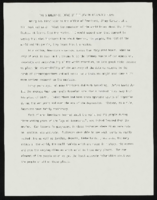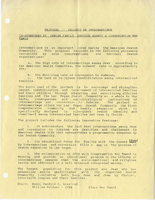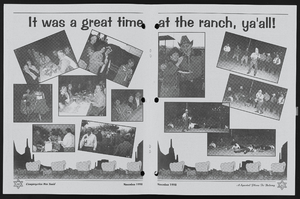Search the Special Collections and Archives Portal
Search Results

Transcript of interview with Charlotte Brascia by Joe Mascellino, February 24, 1977
Date
Archival Collection
Description
Text

Transcript of interview with Beula Jane Adams by Maureen Beth Conner, May 11, 1977
Date
Archival Collection
Description
Text

"The Stereotypic Image of the Jew in Hollywood Films": manuscript draft by Roosevelt Fitzgerald
Date
Archival Collection
Description
From the Roosevelt Fitzgerald Professional Papers (MS-01082) -- Unpublished manuscripts file.
Text
Jocelyn L. Oats oral history interview
Identifier
Abstract
Oral history interview with Jocelyn L. Oats conducted by Rebecca Snetselaar on April 29, 2016 for the Folklife Program of the Nevada Arts Council and the Oral History Research Center at UNLV Libraries. Oats begins the interview by talking about her childhood and family. She explains what she was allowed to have in terms of media and music, what gospel music means to her, and which members of her family are singers. Oats talks about religion, traditions in church, and what it means to sing in church. Lastly, Oats tells stories of her life and where to find gospel music in Las Vegas, Nevada.
Archival Collection
Loretta Whitney oral history interview
Identifier
Abstract
Oral history interview with Loretta Whitney conducted by Rebecca Snetselaar and Binnie Wilkin on April 15, 2016 for the Folklife Program of the Nevada Arts Council and the Oral History Research Center at UNLV Libraries. Whitney begins talking about her family life, childhood, and family histories. She mentions storytelling in education and what education used to be, and explains why she moved to Las Vegas, Nevada. Whitney begins to speak about religion and the church. She explains her family culture and traditions. Lastly, she defines what loving and caring for others means and how she has evolved personally throughout her life.
Archival Collection
Bob Fisher oral history interview
Identifier
Abstract
Oral history interview with Robert Fisher conducted by Barbara Tabach on January 08, 2015 for the Southern Nevada Jewish Heritage Project. In this interview, Fisher discusses his childhood in Minnesota, and the large role Judaism played in his upbringing. He speaks at length about his involvement with United Synagogue of Conservative Judaism over the years, including as regional director of the United Synagogue Youth Far West Region, which took him from Minnesota to California. He talks about his time in Los Angeles, California, and later, about his life in Las Vegas, Nevada, including his broadcasting career as well as involvement with Midbar Kodesh Temple.
Archival Collection

Transcript of interview with Walter Weiss by Claytee White, November 2, 2010
Date
Archival Collection
Description
In this interview, Walter Weiss discusses how Judaism and boxing kept him out of trouble in his youth. Weiss grew up in the Boston area, and started boxing as a teenager. Weiss talks about his boxing training, becoming a runner for a bookmaker, and coming to Las Vegas in the 1950s to be a bookmaker for the Stardust Hotel, and working the slot machine floor. He had several different jobs in various casinos, and discusses different people involved in the gaming industry in Las Vegas.
Walter Weiss life story begins in a Malden, Massachusetts during the Great Depression. His early background was a blend of observant Judaism, secularism, and the effects of the era. He was a troubled youth whose older brother encouraged him to join him in boxing. As Walter explains: I was a wild kid and ... boxing saved my life. His aptitude for boxing led him to be a sparring partner in New York City's famous Spillman Gym. There he met and worked out with some of the greatest fighters of the era, including Rocky Marciano. He recalls how he turned professional while attending the University of Miami and how he first came to Las Vegas in 1958 to escape his personal troubles and find work with a local bookmaker. Thus began his diverse employment history in the casino industry. He details his various positions and the cast of famous and infamous characters of the times. For six years he return to New York and worked as a Wall Street broker before arriving back in Las Vegas in 1973. He talks about his property ownership, lobbying for an amendment to Senate Bill 208, his personal religious changes and a sundry of observations about the changes that occurred as the state took over gaming.
Text



